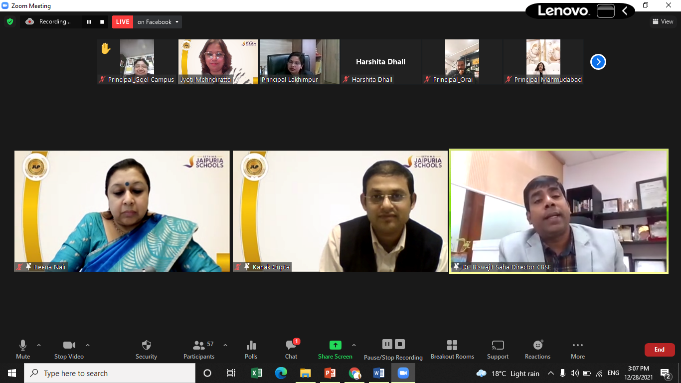There is growing awareness about the adverse impact of prolonged schools’ closure caused by the raging Coronavirus pandemic on the lives of students worldwide. International and national research findings indicate that learning loss apart, students have suffered mental and physical health issues as well.
The need to reimagine Indian education has never been more critical now given the country’s unpreparedness for a digital learning environment coupled with poverty and poor Internet penetration. The time has come for crisis recovery mode to enable improvements in assessment, pedagogy, technology, financing, and parental involvement.
The Seth M.R. Jaipuria Group of schools that runs and manages 43 K-12 schools – with an aggregrate enrolment of 30,000 students instructed by 2,200 faculty — has a presence in 36 cities. Driven by our motto to nurture future-ready students equipped with 21st century skills, we organised the 7th Jaipuria Leadership Programme in December 2021 — attended by 38 school heads — and deliberated and addressed a range of issues from school culture, setting high standards for teacher performance, increased academic expectations for all students and community engagement. During the course of the three-day event, the following points came up and we are happy to share the same with the larger educational fraternity with the hope that collectively, we will do better.
Build back better: Make your school the ‘school of choice’
Addressing the impact and uncertainty of the pandemic era, the need to foster students’ cognitive development as much as their social, emotional and spiritual development emerged as a strong requirement. The school of choice must also focus on bringing all stakeholders together with a common interest to improve children’s lives. Addressing the gathering, the chief guest Dr. Biswajit Saha, Director (Training & Skill Education), CBSE, spoke about the importance of transforming students into confident, independent learners and guiding them on their career path. He also emphasised the importance of skill development and urged schools to adopt a data-centric approach for better administration.

Redefine components of quality education
Continuing from where Dr. Saha left off, the group’s vice chairperson Mr. Shreevats Jaipuria urged school leaders to focus on continuous learning, value inculcation, meeting aspirations of society, according equal importance to co-curricular activities, and lifelong learning as the vital components of quality education.
Incidentally, all Seth M.R. Jaipuria Schools are deeply rooted in the values of Sustainability, Possibility, Integrity, Collaboration, and Empathy — SPICE in short!

Values followed at Seth M.R. Jaipuria Group of Schools
Need to redefine assessments
Addressing the school heads, Professor Dr S. Garimella stressed on the objective of assessment – not to judge but enhance quality of education. Authentic assessments don’t focus only on cognitive understanding but foster the affective and emotional well-being of children. It perfectly synced with Dr. Saha’s address on differentiated assessments.
Plan early and plan well
Chinese philosopher Confucius famously said: “A man who does not plan long ahead will find trouble at his door”. Mr Kanak Gupta, the Director of Seth M.R. Jaipuria Schools, emphasised the need for planning to be a step ahead and referred to Brian Tracy’s famous metaphor ‘Eat That Frog!’ to urge the school heads to tackle the most challenging task first and not procrastinate. With what he referred to as ‘hygiene factors’, Mr Gupta guided the leaders towards setting up systems and processes in schools to avoid last-minute chaos and rush.
Sharpen your saw
An education system is only as good as its teachers. Research has shown that teacher effectiveness is the most significant school-level factor impacting student achievement (McCaffrey, Koretz, Lockwood, & Hamilton, 2004; Rivkin, Hanushek, & Kain, 2005; Rockoff, 2004), and yet little is known about teacher and administrator perceptions of teacher effectiveness. Just like the 7th and final habit as proposed by American educator Stephen Covey, the underlying message throughout the Leadership Programme was to preserve and professionally develop the greatest assets of all schools — its teachers! Let’s all join hands to make learning for our students intellectually appealing and in the process build a community of practice and work towards collective teacher efficacy. After all, John Hattie, through his path-breaking meta-analysis, has stated that teacher efficacy is directly proportional to student achievement!



























